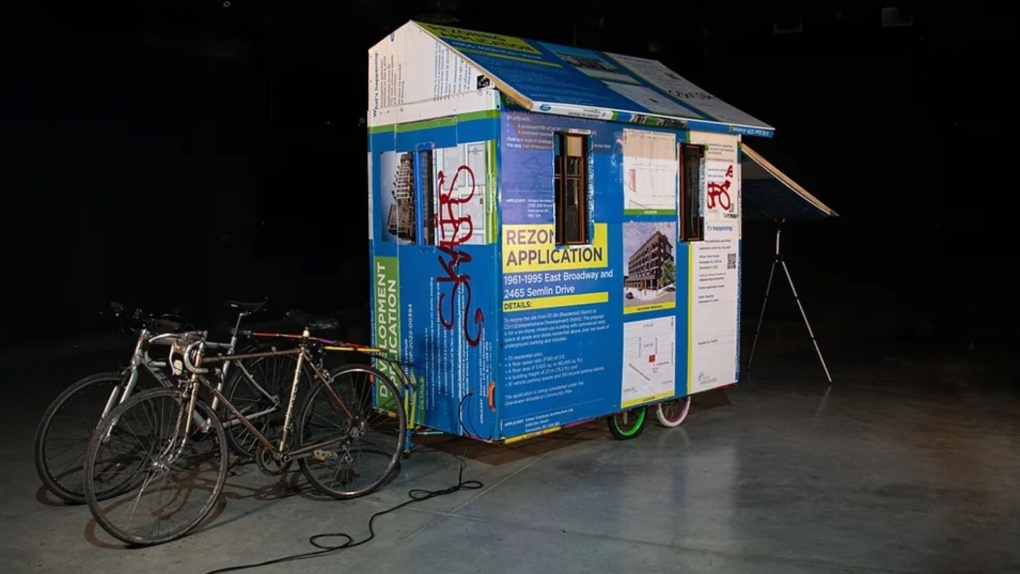Confession booth built from city signs invites Vancouverites to divulge their housing opinions
 Host House, a confession booth built from rezoning and development signs lifted from the streets of Vancouver, invites people to divulge their opinions about the city's housing crisis. (TAPEWORM corps)
Host House, a confession booth built from rezoning and development signs lifted from the streets of Vancouver, invites people to divulge their opinions about the city's housing crisis. (TAPEWORM corps)
A confession booth built from development and rezoning signs is inviting Vancouverites to voice their opinions about the city’s housing crisis.
Measuring 4 by 8 feet, the Host House will be open for confessions this Thursday at 1965 Main St., for an art show dubbed “Damage Noted” at Liquidation World.
TAPEWORM corp is behind the signage structure, which took 20 artists a total of six months, 13 donated bike frames and 14 questionably procured city-owned boards to construct.
The tiny, transient form of modular architecture has popped up at different parks around the city, and a documentary on the confessions the project has inspired is in the works, according to a spokesperson for the group of artists.
Ahead of Thursday’s show, Clyde Montgomery spoke to CTV News from inside the Host House—which is currently stored in his backyard—about the purpose of the booth.
“There’s an abundance of these signs throughout the city. We see them everyday and it starts to become background noise—no one really notices them anymore but they have this imbued meaning,” said Montgomery, a recent graduate of the industrial design program at Emily Carr University.
“We wanted to engage with the public and see how it’s affecting individuals and getting their take on it because, I mean, there’s every different kind of person in Vancouver and it’s a problem for basically everyone. I think it’s important to hear all those different voices for this problem to actually end up being resolved in a way.”
TAPEWORM corp. consists of a rotating cast of friends, many of whom attended Emily Carr together, a board of directors and a small group of private investors.
Montgomery says the group’s goal is to identify problems and then engage with those issues in creative, weird ways by repurposing available materials.
The trailer than transports Host House, for example, is made of bike frames that were donated by shops across the city.
On its website, TAPEWORM’s artistic endeavors are labelled “symptoms,” and include city signs turned into snow shovels or curb cuts. The group has also installed push bars over Norman Doors across the city, hacking a design that often inspires people to mistakenly pull on handles.
If you’re wondering how the group collects signs for their projects, you’re not alone.
“We’d prefer not to answer than question,” Montgomery said.
He also declined to share information about future projects in the works, reasoning they’re “caught up in multiple non-disclosure agreements and bureaucratic purgatory.”
However, he encourages people to come see the Host House for themselves, and to look out for the upcoming documentary about the project, which Odd Society Productions is putting together.
“It really takes small groups of people coming together to actually care about a given problem, and then there will be change within a given area. So I feel like a lot of what TAPEWORM is about is taking ownership over the place that we reside in and, in a positive way, trying to increase our connection with where we live.” Montgomery said. “If we increase our connection with that place, we care for it more. If we care for it more, we treat it better and then we won’t live in an apocalyptic hell.”
CTVNews.ca Top Stories

Trudeau asked Trump for California, Vermont to curb annexation talks
Justin Trudeau says U.S. president-elect Donald Trump kicked the tires on the potential annexation of Canada during their recent meeting in Florida, but the topic was quickly dropped when the prime minister countered with a request for two states.
Man dies after falling into sink hole at Fernie Alpine Resort
An investigation is underway by Elk Valley RCMP after a man died Wednesday after falling into a sink hole at Fernie Alpine Resort.
One Alberta man gets jail, another community time for 2022 Coutts border protest
Two Alberta men have been sentenced for their roles in the illegal Coutts border blockade in 2022.
Liberal leadership: Carney expected to launch bid next week, Clark organizing heavily, Gould considers entering
While longtime cabinet ministers Dominic LeBlanc and Melanie Joly have officially announced they have no plans to run for the Liberal leadership, several well-known faces are organizing behind the scenes to launch bids of their own.
Amid tense backdrop, Canadian warship gets friendly message from Chinese vessel tracking movements
Daybreak on HMCS Ottawa began with a call over the marine radio from a Chinese warship. The call is coming from a Chinese Frigate known as the Yuncheng, the warship has been shadowing HMCS Ottawa through the South China Sea for two days and counting.
'Everything is gone': Sask. business owner loses Los Angeles home to wildfires
A Saskatchewan business owner lost her Los Angeles home as wildfires ravage parts of the city.
Trump gets no-penalty sentence in his hush money case, while calling it 'despicable'
U.S. president-elect Donald Trump was sentenced Friday to no punishment in his historic hush money case, a judgment that lets him return to the White House unencumbered by the threat of a jail term or a fine.
'Devastating beyond words': Paris Hilton shows remnants of home destroyed by L.A. fire
Socialite Paris Hilton shared a video showing her ravaged house, destroyed by the L.A. wildfires., 'I’m standing here in what used to be our home, and the heartbreak is truly indescribable,' Hilton wrote on Instagram.
School software hack hits school boards across six Canadian provinces
School boards across Canada are grappling with the fallout from a significant cyberattack on PowerSchool, a widely used administration software platform.
































